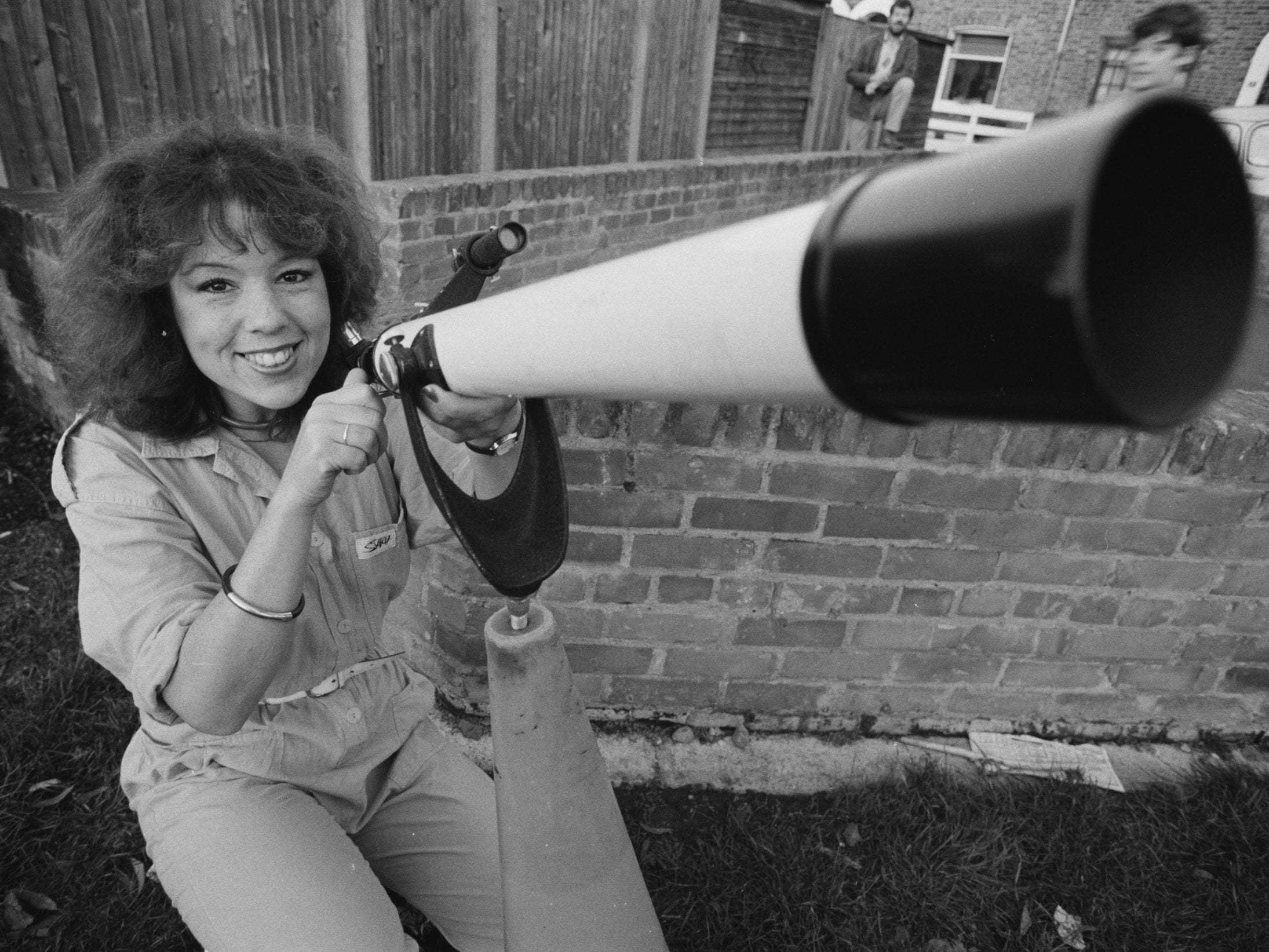Heather Couper: Astronomer who brought the stars to a wide audience
She made a giant leap for women as the first female president of the British Astronomical Association, and has been a contributor to The Independent since 1987

Heather Couper, who has died aged 70, was just seven when she spotted what looked like a bright-green meteor in the sky. Her airline pilot father told her there was no such thing, but newspapers subsequently reported on a “shooting star” and she set her heart on becoming an astronomer.
At the age of 16, she wrote to Patrick Moore, whose television programme The Sky at Night inspired viewers to look to the heavens, and asked whether being female might hamper her ambitions. “Being a girl is no problem at all,” Moore replied.
So she carved out a career as an astronomer and, from 1978 to 1984, while lecturing on the subject, was often seen as a guest or co-presenter on The Sky at Night.
She also succeeded Moore as president of the British Astronomical Association (1984-86), the first woman in the role – one previously occupied by “worthy old gentlemen who preferred to remain discreetly out of the public eye”, aside from Moore, according to New Scientist magazine at the time.
With the ability to popularise astronomy for a wide audience, Couper went freelance to become a television presenter and producer.
She and fellow astronomer Terence Murtagh hosted the 1981 children’s series Heavens Above. The wonders of the universe was the pair’s theme as they examined the planets in the solar system.
Film shot by the American Viking and Voyager space probes vividly brought their words to life. There were also enlightening items such as an imaginary trip to Earth from a planet in the Andromeda galaxy.
Moving on to TV for grown-ups, Couper wrote and presented two of Channel 4’s early science successes.
“Mars, until quite recently, held out the promise of life, but now we know it’s a sun-bleached, sterile world,” was typical of her candid assessments of the subjects in The Planets (1985).
The Stars (1988) was a natural follow-up. “Stars were the sparks that rescued our universe from becoming an ever-cooling and expanding vastness,” explained Couper as she launched the series with the potentially worrying observation that galaxies – “giant, rotating star cities like our own Milky Way” – had been moving fatally further apart. The gravity of stars kept the universe alive, she said.
Couper also presented the marathon 30-part radio series Cosmic Quest (2008), charting the rise of science by tracing the progress of astronomy – and astronomers such as Ptolemy, Copernicus and Halley – through the ages.
She said her career highlight was being the astronomer aboard Concorde in 1986 showing Halley’s Comet to passengers on a flight to New Zealand.
In 1999, on her 50th birthday, Asteroid 3922 Heather, discovered 28 years earlier, was named after her.
Heather Anita Couper was born in Wallasey, Cheshire, in 1949 to Anita (nee Taylor) and George Couper, and brought up in Ruislip, Middlesex.
On leaving St Mary’s Grammar School, Northwood (now Haydon School), she spent two years as a management trainee with Topshop, then owned by the fashion retailer Peter Robinson.
Joining a local astronomical society reignited her interest in astronomy and she began to realise her dream by working as a research assistant at Cambridge Observatories (1969-70), before graduating in astrophysics from Leicester University in 1973.
Couper became a researcher in Oxford University’s astrophysics department and, from 1977 to 1983, a lecturer at the Greenwich Planetarium in the Royal Observatory.
She then concentrated on broadcasting. Nigel Henbest, who became her lifelong companion after they met as students at Leicester University, worked as a researcher and consultant on The Planets and The Stars, then formed Pioneer Productions in 1988 with Couper and TV director Stuart Carter to make science programmes for global markets.
For Pioneer, she presented The Neptune Encounter (1989), about Nasa spacecraft Voyager 2’s flyby of the planet, and Space Shuttle Discovery (1993), as well as writing and narrating Space Shuttle: Human Time Bomb? (2003), investigating the design flaws and cost-cutting measures leading to the disintegration of the returning shuttle Columbia.
As a producer, Couper made Wonders of Weather (1996), Black Holes (1997) and Universe: Beyond the Millennium (1999), as well as episodes of Horizon and Equinox.
Her many radio series as a presenter included Starwatch (1996) and Worlds Beyond (2004-5). She was an author of more than 40 books, many with Henbest, and since 1987 the pair wrote The Independent’s monthly Stargazing column.
Couper was the first female professor of astronomy at Gresham College (1993-96) and, from 1994 to 2009, served as one of the millennium commissioners responsible for allocating £500m to public science projects. She was made a CBE in 2007.
Heather Couper, astronomer, born 2 June 1949, died 19 February 2020
Subscribe to Independent Premium to bookmark this article
Want to bookmark your favourite articles and stories to read or reference later? Start your Independent Premium subscription today.

Join our commenting forum
Join thought-provoking conversations, follow other Independent readers and see their replies